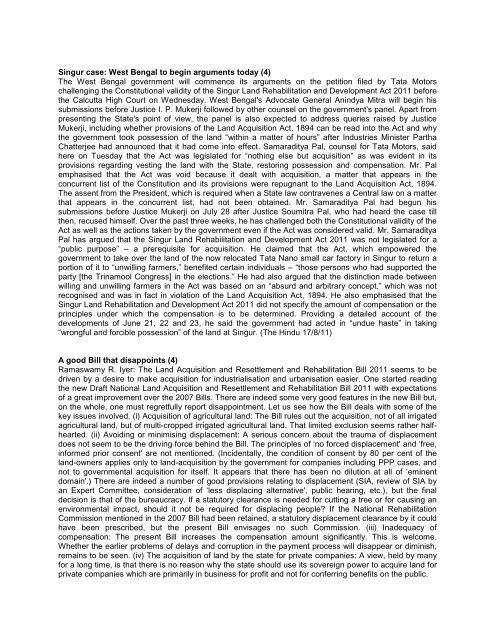land acquisition/sez & displacement â 2011 - Indian Social Institute
land acquisition/sez & displacement â 2011 - Indian Social Institute
land acquisition/sez & displacement â 2011 - Indian Social Institute
You also want an ePaper? Increase the reach of your titles
YUMPU automatically turns print PDFs into web optimized ePapers that Google loves.
Singur case: West Bengal to begin arguments today (4)The West Bengal government will commence its arguments on the petition filed by Tata Motorschallenging the Constitutional validity of the Singur Land Rehabilitation and Development Act <strong>2011</strong> beforethe Calcutta High Court on Wednesday. West Bengal's Advocate General Anindya Mitra will begin hissubmissions before Justice I. P. Mukerji followed by other counsel on the government's panel. Apart frompresenting the State's point of view, the panel is also expected to address queries raised by JusticeMukerji, including whether provisions of the Land Acquisition Act, 1894 can be read into the Act and whythe government took possession of the <strong>land</strong> “within a matter of hours” after Industries Minister ParthaChatterjee had announced that it had come into effect. Samaraditya Pal, counsel for Tata Motors, saidhere on Tuesday that the Act was legislated for “nothing else but <strong>acquisition</strong>” as was evident in itsprovisions regarding vesting the <strong>land</strong> with the State, restoring possession and compensation. Mr. Palemphasised that the Act was void because it dealt with <strong>acquisition</strong>, a matter that appears in theconcurrent list of the Constitution and its provisions were repugnant to the Land Acquisition Act, 1894.The assent from the President, which is required when a State law contravenes a Central law on a matterthat appears in the concurrent list, had not been obtained. Mr. Samaraditya Pal had begun hissubmissions before Justice Mukerji on July 28 after Justice Soumitra Pal, who had heard the case tillthen, recused himself. Over the past three weeks, he has challenged both the Constitutional validity of theAct as well as the actions taken by the government even if the Act was considered valid. Mr. SamaradityaPal has argued that the Singur Land Rehabilitation and Development Act <strong>2011</strong> was not legislated for a“public purpose” – a prerequisite for <strong>acquisition</strong>. He claimed that the Act, which empowered thegovernment to take over the <strong>land</strong> of the now relocated Tata Nano small car factory in Singur to return aportion of it to “unwilling farmers,” benefited certain individuals – “those persons who had supported theparty [the Trinamool Congress] in the elections.” He had also argued that the distinction made betweenwilling and unwilling farmers in the Act was based on an “absurd and arbitrary concept,” which was notrecognised and was in fact in violation of the Land Acquisition Act, 1894. He also emphasised that theSingur Land Rehabilitation and Development Act <strong>2011</strong> did not specify the amount of compensation or theprinciples under which the compensation is to be determined. Providing a detailed account of thedevelopments of June 21, 22 and 23, he said the government had acted in “undue haste” in taking“wrongful and forcible possession” of the <strong>land</strong> at Singur. (The Hindu 17/8/11)A good Bill that disappoints (4)Ramaswamy R. Iyer: The Land Acquisition and Resettlement and Rehabilitation Bill <strong>2011</strong> seems to bedriven by a desire to make <strong>acquisition</strong> for industrialisation and urbanisation easier. One started readingthe new Draft National Land Acquisition and Resettlement and Rehabilitation Bill <strong>2011</strong> with expectationsof a great improvement over the 2007 Bills. There are indeed some very good features in the new Bill but,on the whole, one must regretfully report disappointment. Let us see how the Bill deals with some of thekey issues involved. (i) Acquisition of agricultural <strong>land</strong>: The Bill rules out the <strong>acquisition</strong>, not of all irrigatedagricultural <strong>land</strong>, but of multi-cropped irrigated agricultural <strong>land</strong>. That limited exclusion seems rather halfhearted.(ii) Avoiding or minimising <strong>displacement</strong>: A serious concern about the trauma of <strong>displacement</strong>does not seem to be the driving force behind the Bill. The principles of ‘no forced <strong>displacement</strong>' and ‘free,informed prior consent' are not mentioned. (Incidentally, the condition of consent by 80 per cent of the<strong>land</strong>-owners applies only to <strong>land</strong>-<strong>acquisition</strong> by the government for companies including PPP cases, andnot to governmental <strong>acquisition</strong> for itself. It appears that there has been no dilution at all of ‘eminentdomain'.) There are indeed a number of good provisions relating to <strong>displacement</strong> (SIA, review of SIA byan Expert Committee, consideration of ‘less displacing alternative', public hearing, etc.), but the finaldecision is that of the bureaucracy. If a statutory clearance is needed for cutting a tree or for causing anenvironmental impact, should it not be required for displacing people? If the National RehabilitationCommission mentioned in the 2007 Bill had been retained, a statutory <strong>displacement</strong> clearance by it couldhave been prescribed, but the present Bill envisages no such Commission. (iii) Inadequacy ofcompensation: The present Bill increases the compensation amount significantly. This is welcome.Whether the earlier problems of delays and corruption in the payment process will disappear or diminish,remains to be seen. (iv) The <strong>acquisition</strong> of <strong>land</strong> by the state for private companies: A view, held by manyfor a long time, is that there is no reason why the state should use its sovereign power to acquire <strong>land</strong> forprivate companies which are primarily in business for profit and not for conferring benefits on the public.

















